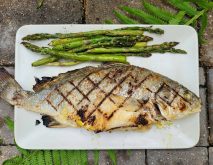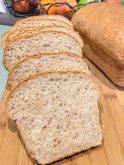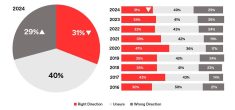When shoppers in New York, London or Paris come across kosher food in their neighbourhood supermarkets, it s just one specialty product among many. When the same thing happens in Berlin, it s a statement.
Berlin s Jewish community, decimated by the Holocaust, has been steadily growing since Germany reunited in 1990. Thousands of Jews have moved in, synagogues, schools and shops have opened and some young rabbis have been trained and ordained.
But presence i sn t the same as acceptance. In a city weighed down by memories of its Nazi past, even small signs that Jews are a part of normal daily life again take on deeper meaning.
Read Also

Mazergroup’s Bob Mazer dies
Mazergroup’s Bob Mazer, who helped grow his family’s company into a string of farm equipment dealerships and the main dealer for New Holland machinery in Saskatchewan and Manitoba, died July 6 from cancer.
One such sign appeared this fall when a local supermarket began selling kosher food.
Yehuda Teichtal, a Brooklynborn Hasidic rabbi who advised the Nah und Gut ( Near and Good ) supermarket on its selections, is thrilled to see this in Berlin.
This was the centre of darkness and evil, where the Nazis planned the extermination of Europe s Jews, and now you can go into a normal supermarket and there s a sign that says kosher, he said.
So he scouted around for a supermarket and found Nah und Gut, an upscale establishment in an affluent section of western Berlin. Many Jews live in the area and several of the city s synagogues are nearby.
Immigrants boost Jewish ranks
There were 160,000 Jews living in Berlin before the Second World War, but only 8,000 in 1945, according to the Jewish Community of Berlin. Most fled, but 55,000 died in concentration camps and 7,000 committed suicide to escape Nazi terror.
Today, there are an estimated 30,000 Jews in the city, most immigrants from the former Soviet Union or young Israelis, who started settling here in the mid-1990s.
Those who keep kosher had a handful of restaurants and small specialty shops around the city where they could find religiously permitted food.
But Teichtal, who runs the Berlin centre of the worldwide Chabad Hasidic movement, thought more Jews would eat kosher food if they didn t have to get to those small shops with their limited opening hours to buy it.
If you have to go to one shop to buy wine, another to get fruit and veg, and a third to buy a piece of gefilte fish, that s one thing, he said. If a person goes to one supermarket and does all their shopping, it s a completely different ball game.
Nah und Gut says the move has brought in several hundred new Jewish customers.
———
This was the centre of darkness and evil, where the Nazis planned the extermination of Europe s Jews, and now you can go into a normal supermarket and there s a sign that says kosher.
YEHUDA TEICHTAL
Brooklyn-born Hasidic rabbi


















